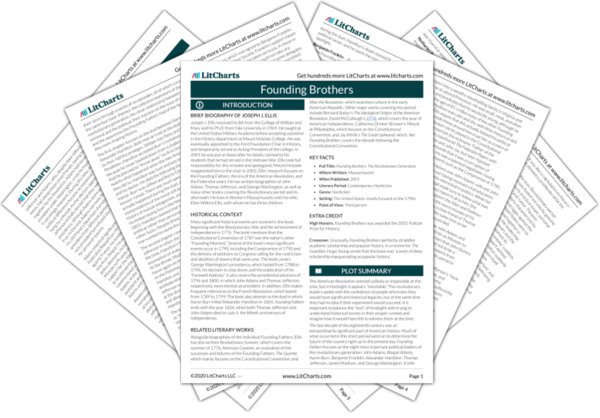George Washington Quotes in Founding Brothers
In fact, Jefferson’s headache coincided with a veritable plague that seemed to descend on the leadership of the Virginia dynasty. Madison was laid up with dysentery, Edmund Randolph remained in Virginia to care for his wife, who had nearly died delivering a stillborn baby, and, most ominously of all, George Washington came down with the flu and developed pulmonary complications that the physicians considered life-threatening. "You cannot conceive the public alarm on this occasion," Jefferson reported to William Short, his former secretary in Paris, adding that Washington's demise would in all probability have meant the abrupt end of the whole national experiment.

Unlock explanations and citation info for this and every other Founding Brothers quote.
Plus so much more...
Get LitCharts A+The very notion of a republican king was a repudiation of the spirit of '76 and a contradiction in terms. Washington’s presidency had become trapped within that contradiction. He was living the great paradox of the early American republic: What was politically essential for the survival of the infant nation was ideologically at odds with what it claimed to stand for.
Unless one believes that ideas are like migratory birds that can fly unchanged from one century to the next, the only way to grasp the authentic meaning of his message is to recover the context out of which it emerged.
For that city and the name it was destined to carry, symbolized the conspiracy that threatened, so Jefferson and his followers thought, all that Virginia stood for.

George Washington Quotes in Founding Brothers
In fact, Jefferson’s headache coincided with a veritable plague that seemed to descend on the leadership of the Virginia dynasty. Madison was laid up with dysentery, Edmund Randolph remained in Virginia to care for his wife, who had nearly died delivering a stillborn baby, and, most ominously of all, George Washington came down with the flu and developed pulmonary complications that the physicians considered life-threatening. "You cannot conceive the public alarm on this occasion," Jefferson reported to William Short, his former secretary in Paris, adding that Washington's demise would in all probability have meant the abrupt end of the whole national experiment.

Unlock explanations and citation info for this and every other Founding Brothers quote.
Plus so much more...
Get LitCharts A+The very notion of a republican king was a repudiation of the spirit of '76 and a contradiction in terms. Washington’s presidency had become trapped within that contradiction. He was living the great paradox of the early American republic: What was politically essential for the survival of the infant nation was ideologically at odds with what it claimed to stand for.
Unless one believes that ideas are like migratory birds that can fly unchanged from one century to the next, the only way to grasp the authentic meaning of his message is to recover the context out of which it emerged.
For that city and the name it was destined to carry, symbolized the conspiracy that threatened, so Jefferson and his followers thought, all that Virginia stood for.











